Students becoming masters
National Guard FLW College Fishing alumni making grade beyond student ranks
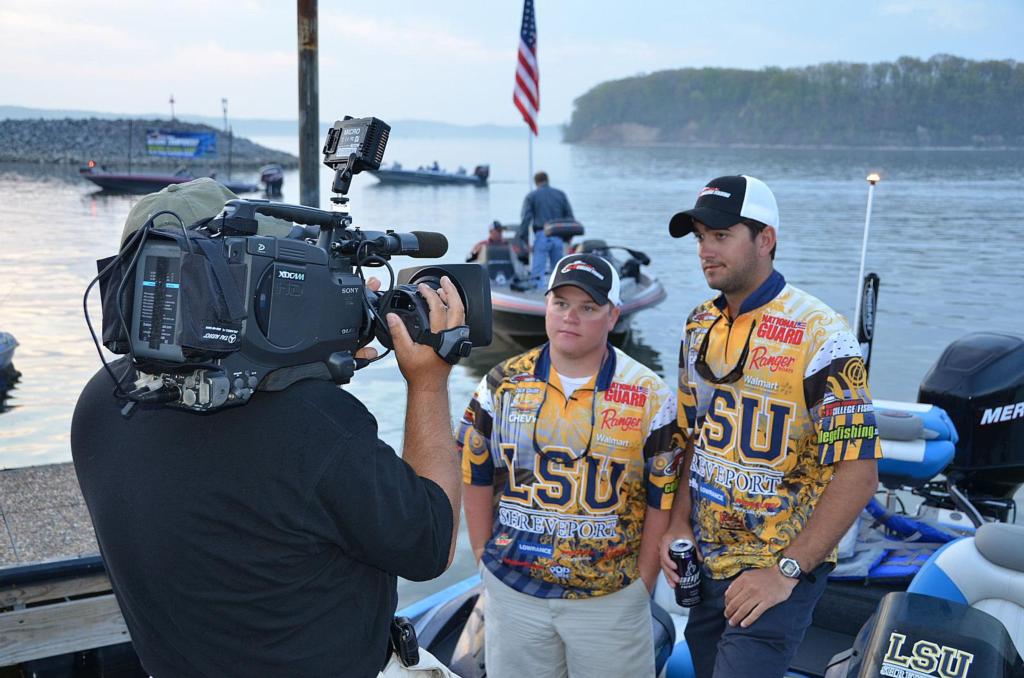
As the sun sets on the third season of National Guard FLW College Fishing, it seems like a good time to evaluate the impact of this program on some of its participants. Many young anglers have now been tested in the post-collegiate arena, and in several cases the students are becoming the masters of tournament fishing.
FLW opened its doors to collegiate anglers in 2009 with a bass-fishing circuit sporting 20 tournaments spread across five divisions plus the chance to qualify for regional competition and a national championship. College anglers benefitted from the geographic reach of the circuit, but what really made it accessible to students was the price structure: Tournaments are free to enter, teams are given a travel allowance, and boats are provided by FLW.
So while tournament fishing was available to collegiate bass clubs prior to the creation of National Guard FLW College Fishing, it had never been so easy to participate or to earn serious funding of the clubs and university programs: Winning teams earn $10,000 to be split between the bass club and the school in qualifying events, $12,500 cash for their school and $12,500 and a Ranger bass boat 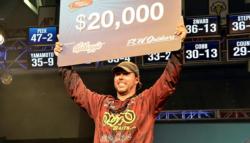 wrapped in school colors plus motor for their fishing club in regionals, and $25,000 for the school and $50,000 and a Ranger boat plus motor in the championship.
wrapped in school colors plus motor for their fishing club in regionals, and $25,000 for the school and $50,000 and a Ranger boat plus motor in the championship.
Making the grade
Auburn University graduate (criminology degree) Richard Peek of Centre, Ala., has arguably done more in 2011 to prove the success of College Fishing as a training ground for tournament anglers than any other alumnus of the circuit. As a co-angler on the Walmart FLW Tour, FLW’s flagship pro circuit, he won an event (Kentucky-Barkley lakes) and top-10ed in two others; in the EverStart Series, he has also earned a win (Pickwick Lake) plus two runner-up finishes, including the championship, as a co-angler. Outside of FLW, Peek was the 2010 Co-angler of the Year in the Alabama South Division of the Bassmaster Weekend Series operated by ABA.
Peek was quick to credit much of his current success and his decision to pursue the sport to his experience in the inaugural year of FLW College Fishing: “Being able to do it in college the way FLW set it up made it real easy for young guys who weren’t sure about tournament fishing. It took the money issue out of it. Being able to leave from class, drive that night, and all you have to do is show up and fish – that’s huge.
“It let us go out there and see if we could catch fish … and give you the confidence to take it to the next level. It helped me decide to jump in and fish in the Tour and EverStart Series.”
A senior at Chestnut Hill College (business administration major), Adrian Avena of Vineland, N.J., seemingly has the Midas touch when it comes to tournament fishing of late. He fished a full season as a pro in the EverStart Series this year, earning a win (Lake Champlain) and 18th place at the championship while finishing the season ranked third 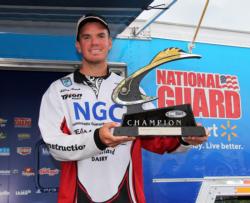 overall in the Northern Division; and he won the only Walmart Bass Fishing League (BFL) event he ever entered as a co-angler in 2010 (St. Clair River).
overall in the Northern Division; and he won the only Walmart Bass Fishing League (BFL) event he ever entered as a co-angler in 2010 (St. Clair River).
“I can thank College Fishing 100 percent on how I was successful this year,” Avena said (learn more about Avena and his quest to make tournament fishing a career at www.adrianavena.com).
Andrew Upshaw, a graduate of Stephen F. Austin University (marketing degree), has parlayed his considerable tournament training, including a stellar couple of years in FLW College Fishing, into the beginning of a professional career. He and travel partner Zach Caudle will be the first two College Fishing alumni to fish a full FLW Tour Majors schedule as professionals in 2012, made possible by sponsorships from Strike Pro America and Damiki Fishing Tackle, respectively. The Hemphill, Texas, resident has another big first attached to his name.
“I’m the first college fisherman to ever make it to the Bassmaster Classic,” said Upshaw, who will fish the championship event in February 2012, having qualified as the winner of the Mercury College BASS Championship.
He continued: “A college student is very strapped for cash … (FLW College Fishing) definitely helps a whole lot. I’m living proof that college fishing can help propel you from a student to your dreams and help make that possible financially … so that I don’t have to go live in a tent somewhere.”
Road trip
FLW College Fishing Tournament Director Kevin Hunt said the variety of fisheries can be a significant learning opportunity for a college team fishing a full slate of events within a division. Young anglers, especially those spending money on an education, can have enough trouble lining up a boat and gathering the funds to fish local tournaments, let alone hitting the road, he said.
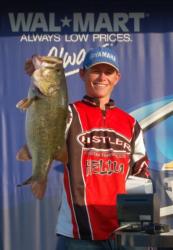
“Gas money, entry fee, travel – we pay for a majority of it. That’s been huge,” Hunt said. “The main benefit is the fact that they have free entry fees and don’t have to bear the expense of towing a boat everywhere.”
Echoing a point of view offered by every college angler interviewed for this article, Upshaw concurred, saying, “The main thing is it pushed me to fish different lakes throughout the country … at different times of year.”
Rapid expansion
Of the driving principle behind National Guard FLW College Fishing, Hunt said: “It’s definitely to grow the sport and to give young anglers an opportunity. A lot of those college anglers wouldn’t have fished competitively or in any of our events if we would not have given them this opportunity.
“There are a number of anglers we’ve seen who have fished College Fishing and moved on because it’s their dream. So we (as a tournament organization) are reaping the benefits.”
It is little wonder that more and more college anglers are feeding into tournament circuits offered by FLW as well as other organizations when considering the incredible expansion of university bass clubs. Hunt said the growth has “definitely exceeded our expectations” since FLW got into the game in 2009, when there were 91 registered bass clubs out of about 1,800 universities. That year alone, somewhere between 180 to 200 clubs fished in FLW College Fishing events, meaning bass clubs doubled.
Part of the bass-club boom can be chalked up to the resources offered at CollegeFishing.com for students who want to start a collegiate bass club or join an existing one; as of late 2011, about 490 clubs had participated 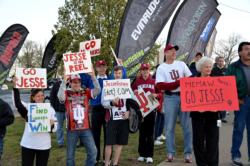 in FLW events, and another 70 or so have “shown interest” for a total reach of about 3,600 students. Another growth factor is the coverage of National Guard FLW College Fishing, which offers tournaments coast to coast.
in FLW events, and another 70 or so have “shown interest” for a total reach of about 3,600 students. Another growth factor is the coverage of National Guard FLW College Fishing, which offers tournaments coast to coast.
“There were events before us … but it was all down South,” Hunt said. “We give more opportunities to more clubs who wouldn’t have been able to afford it or travel that far.”
Fishing fraternity
As in so many other areas of life, success in tournament fishing is not due entirely to skill – a lot of it comes down to who you know. Whether they were looking for a teacher, a travel partner to share expenses, a sponsor or someone to help them out in some other way, the college anglers surveyed all reported finding friends on the tournament trail and listed networking as a big benefit of the experience.
“I consider myself very fortunate for the people I’ve met,” said Avena, who lists pros from the FLW Tour, EverStart Series and BFL as among some of his biggest backers in the fishing world – not to mention a “best friend” he made while the two founded their college’s bass club.
Hunt said: “Preparing them to be a future angler, tournament and otherwise, they get to hang out with the pros and interact. Those pros are kind of their role models.”
Continuing education
With the FLW Tour and Classic ahead, Upshaw has a lot on his horizon in the tournament world, but he has a storied past to nearly match it: He has notched eight top-10 finishes as a boater in the BFL and won the points title in the Louisiana-Texas Division in 2009 while still a college student in his early 20s.
Upshaw said, “Overall, (FLW College Fishing) has prepared me for fishing professionally, but so have the BFLs.”
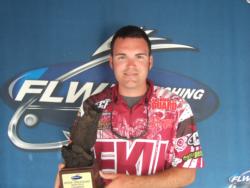
Eastern Kentucky University senior (business and technology emphasis) Tyler Moberly of Berea, Ky., is another College Fishing standout who considers his participation in the BFL as continuing education for tournament bass anglers (learn more about Moberly and his quest to make tournament fishing a career at www.tylermoberly.com). He worked his way up from the back of the boat, where he earned a half-dozen top-10 finishes including two wins (Dale Hollow Lake and Barren River), to the driver’s seat in the BFL this year, ending the 2011 season ranked eighth in the Mountain Division fueled by two top-10 finishes.
“This is my first year being a boater in the BFL. You’ve got to build your foundation,” Moberly said, adding that his collegiate competition complemented by his years as a co-angler were important parts of his fishing education, allowing him to learn from more experienced fishermen. “It helps you to be really versatile … to learn new techniques … you just learn so much about different styles of fishing.”
College Fishing helped open doors for Jake Gipson, who is already in the history books as half of the University of Florida team to win the first two National Guard FLW College Fishing National Championships in 2010 and 2011. After being the first college angler to fish in the Forrest Wood Cup championship, he is back into the books in a big way, as a student of law at the University of Alabama.
While his experience in post-collegiate competition has tested him in new ways, Gipson said College Fishing was integral to his growth as a competitive angler: “I think the College Fishing format challenges 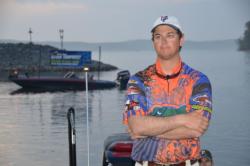 you too. You don’t get a lot of practice, so you have to learn to kind of fish with your gut … trust your instincts. You learn to process things very quickly.”
you too. You don’t get a lot of practice, so you have to learn to kind of fish with your gut … trust your instincts. You learn to process things very quickly.”
Gipson said College Fishing also helped to prepare him for law school and other challenges that lie ahead.
“You learn to work hard, to keep a positive attitude and not to give up until the day is done,” he said. “I think you can carry that into everything in life no matter what you’re doing.”
Heads of the class
In addition to the anglers already highlighted in this article, there are many other students who have seen tournament success beyond college fishing. The following list is in no way comprehensive, but attempts to showcase some of the other National Guard FLW College Fishing anglers who have done well in other venues:
• Clent Davis of the University of Montevallo – five top-10s including a win as either a co-angler in the FLW Tour or a pro in the EverStart Series
• Miles Burghoff of the University of Central Florida (UCF) – four top-10s including a win as a boater in the BFL
• Danny Iles of Lamar University – three top-10s including a win as a boater in the BFL
• Zac Cassil of Winona State University – three top-10s as a co-angler on the FLW Tour and EverStart Series
• Zach Caudle of Louisiana State University – along with Upshaw, the first College Fishing angler to go pro on the FLW Tour